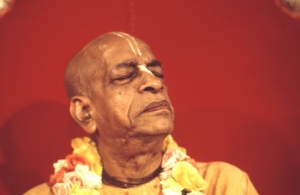CC Antya 17.54: Difference between revisions
m (1 revision(s)) |
No edit summary |
||
| Line 1: | Line 1: | ||
{{ | [[Category:Sri Caitanya-caritamrta - Antya-lila Chapter 17|C054]] | ||
<div style="float:left">'''[[Sri Caitanya-caritamrta|Śrī Caitanya-caritāmṛta]] - [[CC Antya|Antya-līlā]] - [[CC Antya 17|Chapter 17: The Bodily Transformations of Lord Śrī Caitanya Mahāprabhu]]'''</div> | |||
<div style="float:right">[[File:Go-previous.png|link=CC Antya 17.53|Antya-līlā 17.53]] '''[[CC Antya 17.53|Antya-līlā 17.53]] - [[CC Antya 17.55|Antya-līlā 17.55]]''' [[File:Go-next.png|link=CC Antya 17.55|Antya-līlā 17.55]]</div> | |||
{{CompareVersions|CC|Antya 17.54|CC 1975|CC 1996}} | |||
{{RandomImage}} | |||
==== TEXT 54 ==== | ==== TEXT 54 ==== | ||
<div | <div class="verse"> | ||
kṣaṇe mana sthira haya, tabe mane vicāraya, | :kṣaṇe mana sthira haya, tabe mane vicāraya, | ||
balite ha-ila bhāvodgama | :balite ha-ila bhāvodgama | ||
piṅgalāra vacana-smṛti, karāila bhāva-mati, | :piṅgalāra vacana-smṛti, karāila bhāva-mati, | ||
tāte kare artha-nirdhāraṇa | :tāte kare artha-nirdhāraṇa | ||
</div> | </div> | ||
| Line 14: | Line 18: | ||
==== SYNONYMS ==== | ==== SYNONYMS ==== | ||
<div | <div class="synonyms"> | ||
''kṣaṇe''—in a moment; ''mana''—the mind; ''sthira haya''—becomes patient; ''tabe''—at that time; ''mane''—within the mind; ''vicāraya''—He considers; ''balite''—to speak; ''ha-ila''—there was; ''bhāva-udgama''—awakening of ecstasy; ''piṅgalāra''—of Piṅgalā; ''vacana-smṛti''—remembering the words; ''karāila''—caused; ''bhāva-mati''—ecstatic mind; ''tāte''—in that; ''kare''—does; ''artha-nirdhāraṇa''—ascertaining the meaning. | |||
</div> | </div> | ||
| Line 21: | Line 25: | ||
==== TRANSLATION ==== | ==== TRANSLATION ==== | ||
<div | <div class="translation"> | ||
Suddenly, Śrī Caitanya Mahāprabhu became calm and considered His state of mind. He remembered the words of Piṅgalā, and this aroused an ecstasy that moved Him to speak. Thus He explained the meaning of the verse. | Suddenly, Śrī Caitanya Mahāprabhu became calm and considered His state of mind. He remembered the words of Piṅgalā, and this aroused an ecstasy that moved Him to speak. Thus He explained the meaning of the verse. | ||
</div> | </div> | ||
| Line 28: | Line 32: | ||
==== PURPORT ==== | ==== PURPORT ==== | ||
<div | <div class="purport"> | ||
Piṅgalā was a prostitute who said, | Piṅgalā was a prostitute who said, "To hope against hope produces only misery. Utter hopelessness is the greatest happiness." Remembering this statement, Śrī Caitanya Mahāprabhu became ecstatic. The story of Piṅgalā is found in ''Śrīmad-Bhāgavatam'', Eleventh Canto, Eighth Chapter, verses 22-44, as well as in the ''Mahābhārata'', ''Śānti-parva'', Chapter 174. | ||
</div> | </div> | ||
__NOTOC__ | |||
<div style="float:right; clear:both;">[[File:Go-previous.png|link=CC Antya 17.53|Antya-līlā 17.53]] '''[[CC Antya 17.53|Antya-līlā 17.53]] - [[CC Antya 17.55|Antya-līlā 17.55]]''' [[File:Go-next.png|link=CC Antya 17.55|Antya-līlā 17.55]]</div> | |||
__NOTOC__ | |||
__NOEDITSECTION__ | |||
Revision as of 12:28, 24 September 2021

A.C. Bhaktivedanta Swami Prabhupada
TEXT 54
- kṣaṇe mana sthira haya, tabe mane vicāraya,
- balite ha-ila bhāvodgama
- piṅgalāra vacana-smṛti, karāila bhāva-mati,
- tāte kare artha-nirdhāraṇa
SYNONYMS
kṣaṇe—in a moment; mana—the mind; sthira haya—becomes patient; tabe—at that time; mane—within the mind; vicāraya—He considers; balite—to speak; ha-ila—there was; bhāva-udgama—awakening of ecstasy; piṅgalāra—of Piṅgalā; vacana-smṛti—remembering the words; karāila—caused; bhāva-mati—ecstatic mind; tāte—in that; kare—does; artha-nirdhāraṇa—ascertaining the meaning.
TRANSLATION
Suddenly, Śrī Caitanya Mahāprabhu became calm and considered His state of mind. He remembered the words of Piṅgalā, and this aroused an ecstasy that moved Him to speak. Thus He explained the meaning of the verse.
PURPORT
Piṅgalā was a prostitute who said, "To hope against hope produces only misery. Utter hopelessness is the greatest happiness." Remembering this statement, Śrī Caitanya Mahāprabhu became ecstatic. The story of Piṅgalā is found in Śrīmad-Bhāgavatam, Eleventh Canto, Eighth Chapter, verses 22-44, as well as in the Mahābhārata, Śānti-parva, Chapter 174.